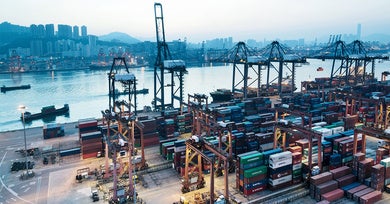Financing value chains: A need for speed
The technological revolution has come to stay in finance, bringing with it a transformation in how small and medium enterprises (SMEs) in value chains obtain financing and streamlining relations between anchor companies and their suppliers, customers, and collaborators. How does it work?
Imagine a company that manufactures aluminum auto parts in Mexico, the principal anchor between the metal supplier and the customer who buys the finished product. The supplier requests the payment as soon as possible, within 30 days, due to its limited working capital. However, 270 days elapse from the time when the company receives the supplies and produces the parts until the sale of the final product. Clearly the money cycle does not match, and the company must pay for its purchases before producing the parts, making the sale and even charging the customer.
Existing market conditions make the situation even more difficult, and the increase in aluminum prices does not allow price adjustments from the company to the customers at the same pace that price metal fluctuates. This means that costs for the company increases more rapidly than the final price of its products.
Not only Mexico’s automotive industry suffers from the complexities of the cash flow ratio (between the average period to pay the supplier, process the supplies, and collect from the customer), it is even worse in other industries, such as supermarkets.
Moreover, the World Trade Organization says that half of all SME requests for financing are rejected, compared to only 7% of the requests made by multinational companies. Access to appropriate and timely financial services for all actors in the value chain is key to achieving successful results. Not only large companies, large producers and traders need access to appropriate financial services suited to their money cycles; small producers need them even more for their survival and financial balance. Thus, value chain financing seeks to fill the gaps created in the anchor company-supplier relationship, as well as to mitigate the perceived risks through innovative ways of providing financial services.
But what is the relationship with technology?
Value chain financing requires trusting and durable relationships among the different actors and financial institutions. Each party involved must know and understand the other. Access to innovative and flexible financial products and services is vital. Financial technology (fintech) companies help to make this happen and ensure that financing is flexible, transparent, reliable, and accessible 24/7.
Fintech companies are a bridge between the anchor company’s requirements and its suppliers and collaborators, through technologies applied to banks’ middle and back offices. By using internet platforms, fintech allow millions of SMEs to access loans, under conditions equal to those enjoyed by larger and more established companies, the missing piece in the puzzle without any doubt.
Most financial innovation companies in Latin America and the Caribbean have arisen in the region’s largest markets, including Brazil, Mexico, Colombia, Argentina and Chile. Alliances between fintech companies and financial institutions have been key to bringing promising solutions to scale. But it is not simple.
IDB Invest is an essential part of the value chain financing circuit in the region, through strategic alliances with its clients (the region’s large anchor companies) and fintech firms. These alliances allow IDB Invest to support the base of the pyramid in Latin America efficiently.
The first step was taken in Mexico, where a framework contract was signed with the fintech eFactor, a Mexican company that offers electronic factoring services for the discount of credit rights derived from the demand for goods and services by large buyers. This marks an important milestone for IDB Invest in its value chain financing transactions and in the creation of scalable and efficient solutions.
You can also see more on the impact of the fintech revolution in Latin America and the Caribbean in this full report.
Subscribe to receive more content like this!
[mc4wp_form]





